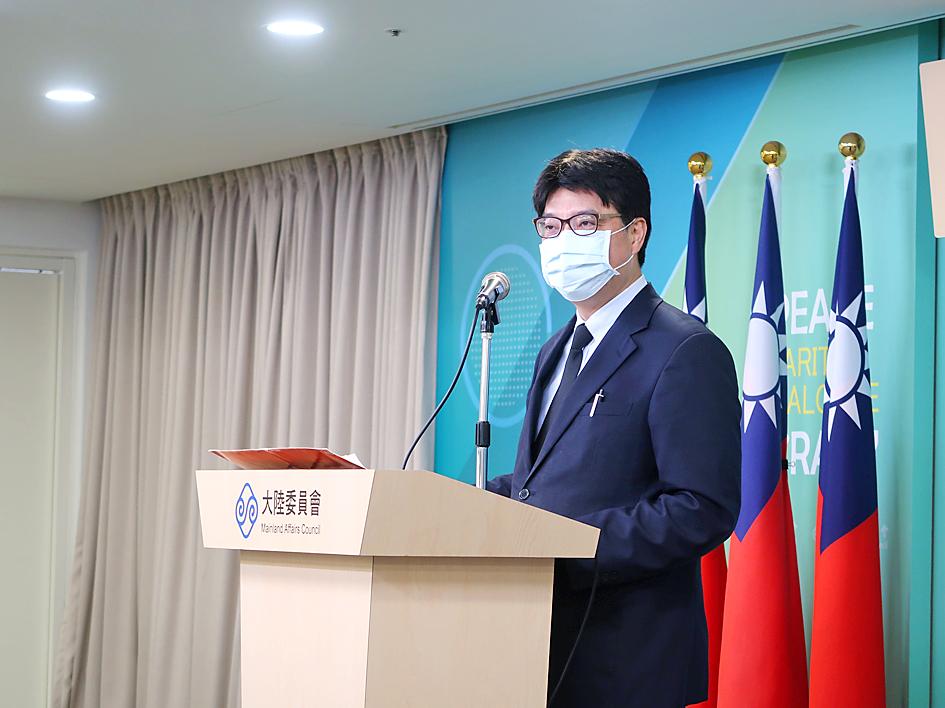China’s understanding of the so-called “1992 consensus” leaves no room for the Republic of China (ROC), Mainland Affairs Council (MAC) spokesman Chiu Chui-cheng (邱垂正) said yesterday, after Beijing criticized comments on the issue by Chinese Nationalist Party (KMT) Chairman Eric Chu (朱立倫).
Chu on Monday told the Brookings Institution in the US — where he is leading a delegation of KMT officials on an 11-day tour — that the party’s “1992 consensus” was a “non-consensus consensus” and an example of “constructive ambiguity.”
“We are mislabeled by some people. Some media say we are a pro-China party. It is totally wrong. We are a pro-US party, forever,” Chu said in a keynote speech at the Washington-based institute.

Photo: CNA
The “1992 consensus” — a term former MAC chairman Su Chi (蘇起) in 2006 admitted making up in 2000 — refers to a tacit understanding between the KMT and the Chinese government that both sides of the Taiwan Strait acknowledge there is “one China,” with each side having its own interpretation of what “China” means.
Asked about the comments yesterday, China’s Taiwan Affairs Office (TAO) spokesman Ma Xiaoguang (馬曉光) told a regular news briefing in Beijing that “willful distortions of the 1992 consensus will not be tolerated.”
“Any political party, group or individual on the island seeking to maintain peace across the Taiwan Strait must ... keep a clear head, stay on the correct path and be on the right side of history,” Xinhua news agency quoted him as saying.
“Taiwan is a part of China. Cross-strait affairs is a family matter for Chinese compatriots on both sides and it should be handled by the family without outside meddling,” he said.
The KMT should “stay on the correct path,” Ma added in a rebuke of Chu’s visit to the US.
Chiu told a news conference in Taipei that Ma “has made plain that the communists see no difference between the 1992 consensus and accepting its one China principle.”
“This formula does not allow any space for the Republic of China to exist. For that reason, it was rejected by the overwhelming majority of Taiwanese,” he said.
Taiwanese know that China uses the “1992 consensus” and the “one China” principle as instruments to further its so-called unification of Taiwan, he said, adding that Taipei firmly opposes any infringement of the nation’s sovereignty.
“We urge Beijing to give up the political framework it seeks to impose on Taiwan, abandon the use of armed threats and acknowledge the reality that the ROC exists,” he said.

The Central Weather Administration (CWA) yesterday said it expected to issue a sea warning for Typhoon Fung-Wong tomorrow, which it said would possibly make landfall near central Taiwan. As of 2am yesterday, Fung-Wong was about 1,760km southeast of Oluanpi (鵝鑾鼻), Taiwan’s southernmost point, moving west-northwest at 26kph. It is forecast to reach Luzon in the northern Philippines by tomorrow, the CWA said. After entering the South China Sea, Typhoon Fung-Wong is likely to turn northward toward Taiwan, CWA forecaster Chang Chun-yao (張峻堯) said, adding that it would likely make landfall near central Taiwan. The CWA expects to issue a land

Taiwan’s exports soared to an all-time high of US$61.8 billion last month, surging 49.7 percent from a year earlier, as the global frenzy for artificial intelligence (AI) applications and new consumer electronics powered shipments of high-tech goods, the Ministry of Finance said yesterday. It was the first time exports had exceeded the US$60 billion mark, fueled by the global boom in AI development that has significantly boosted Taiwanese companies across the international supply chain, Department of Statistics Director-General Beatrice Tsai (蔡美娜) told a media briefing. “There is a consensus among major AI players that the upcycle is still in its early stage,”

The Central Weather Administration (CWA) yesterday said it is expected to issue a sea warning for Typhoon Fung-wong this afternoon and a land warning tomorrow. As of 1pm, the storm was about 1,070km southeast of Oluanpi (鵝鑾鼻), Taiwan’s southernmost point, and was moving west-northwest at 28 to 32kph, according to CWA data. The storm had a radius of 250km, with maximum sustained winds of 173kph and gusts reaching 209kph, the CWA added. The storm is forecast to pass near Luzon in the Philippines before entering the South China Sea and potentially turning northward toward Taiwan, the CWA said. CWA forecaster Chang Chun-yao (張峻堯) said

PREPARATION: Ferry lines and flights were canceled ahead of only the second storm to hit the nation in November, while many areas canceled classes and work Authorities yesterday evacuated more than 3,000 people ahead of approaching Tropical Storm Fung-wong, which is expected to make landfall between Kaohsiung and Pingtung County this evening. Fung-wong was yesterday morning downgraded from a typhoon to a tropical storm as it approached the nation’s southwest coast, the Central Weather Administration (CWA) said, as it issued a land alert for the storm. The alert applies to residents in Tainan, Kaohsiung, Pingtung and Taitung counties, and the Hengchun Peninsula (恆春). As of press time last night, Taichung, Tainan, Kaohsiung, and Yilan, Miaoli, Changhua, Yunlin, Pingtung and Penghu counties, as well as Chiayi city and county had